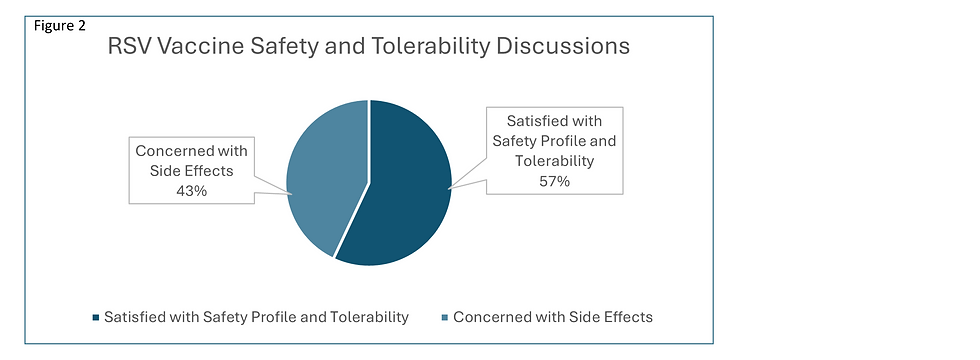RSV Vaccine Peer-to-Peer Keyword Analysis
Topics/keywords: ‘rsv’, ‘respiratory syncytial virus’. Data types: posts, comments, likes, polls Geographical segment: global physicians, physicians by region
Analyzed data points: 3,194
Specialties: Infectious Disease, Allergy and Immunology, Pulmonology, Pediatrics, Internal Medicine, Family Medicine, General Medicine
Countries analyzed: 29
Reach: 166,126
Introduction
This report presents a detailed analysis of physicians' discussions on the topic of the RSV vaccine, based on data collected from the G-Med platform. Key insights have been gathered through sentiment analysis and statistical evaluation of the topics discussed, highlighting geographical differences and trends in medical approaches. A keyword-based approach identified recurring concerns, and statistics were likewise compiled from post interactions (views, comments, and likes). Contrasting opinions on various concerns (e.g., in favor vs. against) were quantified and presented as percentages.
The findings provide a comprehensive overview of the challenges, innovations, and regional preferences of G-Med physicians in regards to the RSV vaccine, shedding light on the sentiments and strategies favored by medical professionals.
Main Concerns of G-Med Physicians on the RSV Vaccine

Antibody Responses (31% of physician discussions): Discussions centered around the importance of antibody responses as a primary indicator of vaccine efficacy. Physicians highlighted the need for vaccines to generate robust and durable antibody levels, particularly for high-risk populations such as infants and elderly individuals.
67% of discussions were positive, highlighting optimism about antibody generation as a vaccine efficacy marker.
33% were neutral in tone, discussing more technical aspects.
Durability of Immunity (28%): Concerns about the longevity of protection provided by the vaccine were a key focus. Physicians stressed the importance of follow-up studies to evaluate how effectively the vaccine protects over time and across different population groups.
Safety and Tolerability (15%): Vaccine safety was a prominent topic, with discussions focusing on the vaccine’s safety profile and centering on minimizing adverse reactions and ensuring tolerability for all age groups. (See Figure 2)
57% of discussions were positive, emphasizing improvements in minimizing adverse effects.
43% of discussions expressed physicians’ concerns about common side effects as well as rare but severe adverse events.
Infectious Disease Dynamics (11% of discussions): Discussions emphasized the role of RSV in the broader landscape of infectious diseases, often comparing its seasonal patterns and impact to other respiratory viruses.
Immunization in Vulnerable Groups (8%): Targeting vulnerable populations, such as pregnant women, neonates, and older adults, emerged as a significant concern. Physicians debated strategies to improve vaccine coverage and outcomes in these high-risk groups. Attention was given in particular to the challenges of protecting adults over 80 years old, a demographic noted for higher susceptibility to severe outcomes from RSV infections.
Vaccination Schedules and Doses (7%): Physicians discussed optimizing vaccine schedules and dosing, including the potential for single-dose versus multi-dose regimens and their implications for public health campaigns.
Cellular Immunity and Humoral Dynamics (6%): A significant focus was on the interplay between humoral and cellular immune responses, particularly in understanding vaccine efficacy and immune protection in older adults.
Cost and Accessibility (4%): The affordability of the vaccine and its equitable distribution were discussed as barriers to widespread adoption. Physicians suggested that addressing cost issues is critical to ensuring broader vaccine access, especially in low-resource settings.

Geographical Differences in Physicians’ RSV Vaccine Concerns

United Kingdom and Canada:
Discussions emphasize optimizing vaccine schedules and addressing public trust in vaccination strategies to enhance coverage.
Brazil:
Significant discussions on vaccine dosing strategies, with a focus on the timing of the third dose and its administration in different populations.
United States:
Discussion on improving vaccine distribution and addressing public skepticism to ensure effective immunization coverage.
France:
Physicians discuss side effects such as myocarditis, particularly in relation to mRNA vaccines, and strategies to minimize adverse events.
Spain and Mexico:
A shared focus on vaccine doses and their role in broader public health initiatives.
Turkey:
Focus on seasonal impacts of respiratory viruses, including RSV, and the importance of timely vaccine rollouts to mitigate winter outbreaks.
Hungary:
Key focus on monitoring antibody levels to evaluate vaccine efficacy and guide future immunization campaigns.

Engagement Recommendations:

As can be seen from the report,there are some knowledge gaps on the topic of the RSV vaccine, especially surrounding dose and schedule best practices and side effects. An awareness campaign could be beneficial in this case, as well as a traffic-driving campaign in cases where there is a brand dot com.
G-Med's Awareness Package or Traffic-Driving Package could be a good fit here.





.png)